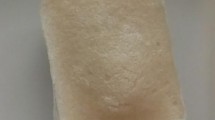Abstract
Wound contraction is a major component of second-intention wound healing. The mechanism of this process is not completely understood. Two theories have been described for the mechanism of the wound contraction. To evaluate the collagen cross-linking inhibition on wound contraction, the present study was carried out. Macroscopical aspects of second-intention healing of full-thickness, excisional wounds were studied in five normal male mixed-breed dogs. Under general anesthesia, two full-thickness skin wounds (20 × 20 mm) were created on the back of each dog symmetrically. Left-side wounds (test group) and right-side wounds (control group) were treated topically with beta-aminopropionitrile fumarate 5 mg/ml in methyl cellulose gel and methyl cellulose gel, respectively. Wounds were treated starting at 24 h after wounding and continued for ten successive days. The wounds were evaluated over a 4-week period. At the days 0, 3, 7, 10, 14, 17, 21, 24, and 28, digital photographs were taken of all wounds. Rulers were held vertically and horizontally close to the wound as a reference. The area of the epithelialization and granulation tissue were measured for each wound using Scion Image software. Percent of the wound contraction, epithelialization, and healing were calculated for each wounds. Wound contraction, epithelialization, and healing were significantly decreased in the wounds treated by beta-aminopropionitrile fumarate (P < 0.05). Our data demonstrated that the collagen and collagen cross-linking play a key role in the wound contraction and healing during the first 10 days of the wound healing.



Similar content being viewed by others
References
Bouisson H, Pieraggi M, Julian M, Uhart D, Kokolo J (1988) Fibroblasts in dermal tissue repair: electron microscopic and immunohistochemical study. Int J Dermatol 27(8):564–567
Cohen IK (1985) Can collagen metabolism be controlled; theoretical considerations. J Trauma 25:410–412
Doillon CJ, Dunn MG, Bender E, Silver FH (1985) Collagen fiber formation in repair tissue: development of strength and toughness. Coll Relat Res 5(6):481–492
Ehrlich HP (1988) Wound closure: evidence of cooperation between fibroblast and collagen matrix. Eye 2:149–157
Eyre D (1987) Collagen cross-linking amino acids. Meth Enzymol 144:115–139
Gabbiani G, Ryan GB, Majno G (1971) Presence of modification fibroblast in granulation tissue and their possible role in wound contraction. Experientia 27(5):549–550
Gibeault JD, Cravens RB Jr, Chvapil M (1989) Transport of beta-aminopropionitrile through intact skin or scar tissue. J Surg Res 47(2):155–158 Aug
Goslen JB (1988) Wound healing for the dermatologic surgeon. J Dermatol Surg Oncol 14(9):959–972
Hoffman DL, Owen JA, Chvapil M (1983) Healing of skin incision wounds treated with topically applied BAPN free base in the rat. Exp Mol Pathol 39(2):154–162 Oct
Johnston DE (1977) The processes in wound healing. J Am Anim Hosp Assoc 13:186–196
Joseph HL, Roisen FJ, Anderson GL, Barker JH, Weiner LJ, Tobin GR (1997) Inhibition of wound contraction with locally injected lathyrogenic drugs. Am J Surg 174(3):347–350 Sep
Last JA, Armstrong LG, Reise KM (1990) Minireview: biosynthesis of collagen croolonks. Int J Biochem 22(6):559–569
Lee AH, Swaim SF, Yang ST (1986) The effects of petrolatum, polyethylene glycol, nitrofurazone, and a hydroactive dressing on open wound healing. J Am Anim Hosp Assoc 22:443–451
Lee AH, Swaim SF, McGuire JA (1988) Effects of chlorhexidine diacetate, povidone iodine, and polyhydroxydine on wound healing in dogs. J Am Anim Hosp Assoc 24:77–84
Majno G (1979) The story of the myofibroblasts. Am J Surg Pathol 3(6):535–542
McGrath MH, Simon RH (1983) Wound geometry and the kinetic of wound contraction. Plast Reconstr Surg 72(1):66–72
Nimbi ME (1988) Biochemistry and biomechanics. In: Nimbe ME (ed) Collagen. vol. 2. CRC, Boca Raton, pp 162–175
Nimni ME, Deshmukh K, Gerth N (1969) Changes in collagen metabolism associated with the administration of D-penicillamine and various amino and thiol compounds. Biochem Pharmacol 18(4):707–714
Peacock EE (1984) Contraction. In: Peacock EE (ed) Wound repair. 3rd edn. Saunders, Philadelphia, pp 38–90
Peacock EE, Madden JW (1969) Some studies on the effects of b-aminopropionitrile in patient with injured flexor tendons. Surgery 66(1):215–223
Redden RA, Doolin EJ (2003) Collagen crosslinking and cell density have distinct effects on fibroblast-mediated contraction of collagen gels. Skin Res Technol 9(3):290–293
Singer II, Kawka DW, Kazazis DM, Clark RA (1984) In vivo co-distribution of fibronectin and actin fibers in granulation tissue: immunofluorescence and electron microscope studies of the fibronexus at the myofibroblast surface. J Cell Biol 98(6):2091–2106
Steenfos HH (1994) Growth factors and wound healing. Scand J Plast Reconstr Hand Surg 28(2):95–97
Swaim SF, Lee AH (1987) Topical wound medications: a review. J Am Vet Med Assoc 190(12):1588–1593
Swaim SF, Henderson RA (1990) Wound dressing materials and topical medication. In: Swaim SF, Henderson RA (eds) Small animal wound management. Lea and Febiger, Philadelphia, pp 34–52
Swaim SF, Hinkle SH, Bradley DM (2001) Wound contraction: basic and clinical factors. Compendium 23:20–24
Author information
Authors and Affiliations
Corresponding author
Rights and permissions
About this article
Cite this article
Sardari, K., Sharifi, S. Effect of collagen cross-linking inhibition by local application of beta-aminopropionitrile fumarate on wound contraction and healing (macroscopic study). Comp Clin Pathol 17, 179–183 (2008). https://doi.org/10.1007/s00580-007-0716-9
Received:
Accepted:
Published:
Issue Date:
DOI: https://doi.org/10.1007/s00580-007-0716-9




